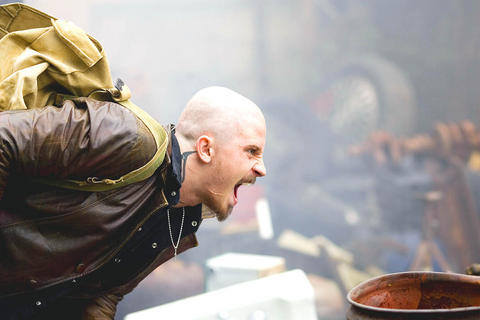In the latest flashy, pretentious exploitation movie from James Wan (Saw and Dead Silence), Kevin Bacon plays Nick Hume, an insurance adjuster who sees his oldest son die at the hands of a machete-wielding young punk during a street gang's robbery of a gas station.
Nick later kills the perpetrator, setting off a police investigation and a cycle of violence that draws in the punk's older brother, Billy Darley (Garrett Hedlund), the gang's leader; his racially mixed crew; and his father, Bones (John Goodman).
Based on Brian Garfield's novel - a sequel to the book that spawned the 1974 film Death Wish - Wan's film is a middle-class white man's payback fantasy, leavened with phony references to class difference. Nick goes from pencil pusher to vigilante superhero in record time, racking up killings and personal tragedies en route to a climactic shootout that imitates elements of the Taxi Driver finale, right down to the shaved head, blown-off fingers and gushing neck wound.

Photo: courtesy of ARM
Aside from a stunning three-minute tracking shot as the gang pursues Nick through a parking garage, and Bacon's hauntingly pale, dark-eyed visage, Wan's film is a tedious, pandering time-waster. It keeps telling us that an eye-for-an-eye philosophy makes the world blind, but its heart is attuned to a quote from Bones: "Go with God and a bag full of guns."

Photo: courtesy of ARM

One of the biggest sore spots in Taiwan’s historical friendship with the US came in 1979 when US president Jimmy Carter broke off formal diplomatic relations with Taiwan’s Republic of China (ROC) government so that the US could establish relations with the People’s Republic of China (PRC). Taiwan’s derecognition came purely at China’s insistence, and the US took the deal. Retired American diplomat John Tkacik, who for almost decade surrounding that schism, from 1974 to 1982, worked in embassies in Taipei and Beijing and at the Taiwan Desk in Washington DC, recently argued in the Taipei Times that “President Carter’s derecognition

This year will go down in the history books. Taiwan faces enormous turmoil and uncertainty in the coming months. Which political parties are in a good position to handle big changes? All of the main parties are beset with challenges. Taking stock, this column examined the Taiwan People’s Party (TPP) (“Huang Kuo-chang’s choking the life out of the TPP,” May 28, page 12), the Democratic Progressive Party (DPP) (“Challenges amid choppy waters for the DPP,” June 14, page 12) and the Chinese Nationalist Party (KMT) (“KMT struggles to seize opportunities as ‘interesting times’ loom,” June 20, page 11). Times like these can

JUNE 30 to JULY 6 After being routed by the Japanese in the bloody battle of Baguashan (八卦山), Hsu Hsiang (徐驤) and a handful of surviving Hakka fighters sped toward Tainan. There, he would meet with Liu Yung-fu (劉永福), leader of the Black Flag Army who had assumed control of the resisting Republic of Formosa after its president and vice-president fled to China. Hsu, who had been fighting non-stop for over two months from Taoyuan to Changhua, was reportedly injured and exhausted. As the story goes, Liu advised that Hsu take shelter in China to recover and regroup, but Hsu steadfastly

You can tell a lot about a generation from the contents of their cool box: nowadays the barbecue ice bucket is likely to be filled with hard seltzers, non-alcoholic beers and fluorescent BuzzBallz — a particular favorite among Gen Z. Two decades ago, it was WKD, Bacardi Breezers and the odd Smirnoff Ice bobbing in a puddle of melted ice. And while nostalgia may have brought back some alcopops, the new wave of ready-to-drink (RTD) options look and taste noticeably different. It is not just the drinks that have changed, but drinking habits too, driven in part by more health-conscious consumers and